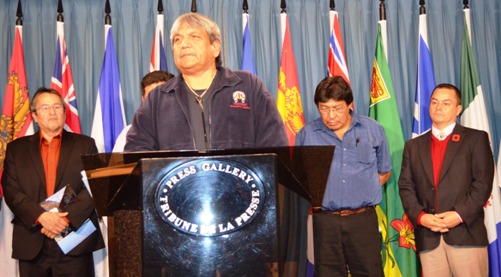The Toronto Star, has the largest circulation in Canada. The paper has an enormous impact on federal and Ontario politics as well as shaping public opinion.
OTTAWA — National chief Shawn Atleo wants the premiers to recognize First Nations as full and equal partners in developing natural resources, but he says such recognition should not have to wait for politicians to agree on a national energy plan.
The head of the Assembly of First Nations and other aboriginal leaders are meeting today with premiers in Lunenburg, N.S., in advance of the annual Council of the Federation summit on inter-provincial relations.
The premiers, like Atleo, are consumed with devising better ways to develop natural resources so that more people can benefit, and so that the environment does not pay too steep a price.
But details of what a national energy strategy would look like are vague, and buy-in from all the provinces is uncertain — especially now that Alberta and British Columbia are sparring openly over the Northern Gateway pipeline.
























